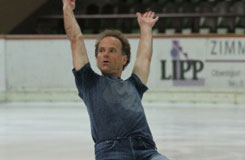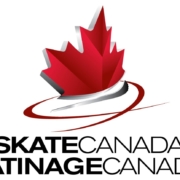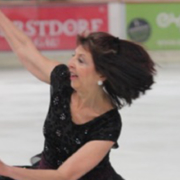Skating for the joy of it, Gary Beacom wins big at the ISU Adult Figure Skating Competition
Gary Beacom’s excellent life adventure took one more turn last month when he decided to enter the ISU Adult Figure Skating Competition in Obertsdorf, Germany for the first time.
He is 54 years old, still with that enigmatic hint of a grin, that inquiring mind, and that wish to step onto a new path – and why walk the way anyone else walks?
He didn’t go to revisit the career of his youth, when he won the Canadian silver medal twice in 1983 and 1984 behind Brian Orser, took 11th at the 1984 Olympics, won the world professional skating championships and attracted the eye of the iconic Jayne Torvill and Christopher Dean, who adopted him into their world-wide tour, impressed with his brand of awe-inspiring transitional tricks and creativity.
His quest at the international adult championships was much simpler. “I didn’t look at it as a competition,” he said during a stop in Toronto on the way home to Victoria, B.C. “It was a chance to get out there and perform and be the best I could be. And make sure the program fit the rules. And play the game.” He had never competed under the most recent ISU scoring system, the code of points. He made sure he checked all the boxes, worked on level four spins and footwork.
Indeed, the record number of competitors (432 skaters, aged 28 to 78, with record-sized fields up to 35 competitors – compared to 332 skaters last year) bodes well for the future of the adult movement, finding joy in skating, staying healthy and fit for life through the sport. Witness the run of Midori Ito, who won last year, but showed up in 2011 with far fewer elements than required, uncertain of the rules. But Ito didn’t care. She competed for the joy of it, and applauded every competitor. Back home, teaching skating, Ito found more and more teaching requests from adults. She knew it was a chance to enjoy her sport again.
Inside, Beacom would have liked to have landed triple flips and triple Lutzes. He still feels that he has the strength and skill to do them – and he takes care of his body. He even dreamed of doing a triple Axel – an ambitious jump for a man of his generation, let alone his age – but never quite got there. He did a triple Salchow last year. A couple of years ago, he did a triple Lutz. He’s still working on overcoming his bad habits and improving his jumps, he said.
His one Achilles heel? An old chronic ankle injury, suffered years ago while he was playing volleyball, trying to block a spike. He leg slid beneath a net and a lumbering giant of a man fell on it, spraining it badly. If Beacom jumps too much, the ankle haunts him. He’s working on a technique so that his landings will be softer. And he got a new pair of boots a couple of months ago, a heavy pair of brogues with stiff imitation alligator uppers and blade hardware that is solid. They aren’t things of beauty, but he needed the support for the gimpy ankle.
At the adult championships for his life stage, Beacom won, big time. Not only did he take the men’s Masters Elite III free skate (for skaters 48 to 57) by more than 17 points, but he won the artistic free skate as well, by almost eight points, attracting marks as high as 9.75 for performance. Beacom didn’t even look at the scores. On top of it all, he won the Paula Smart Award for the highest score in the artistic event (male or female) at the event. That win hit home most.
“I’m really proud of that,” he said. “The top three ladies in the elite Masters Elite II (ages 38 to 48), were awesome and creative.”
Beacom showed up in style, skating to a funky version of Beethoven’s Moonlight Sonata, wearing a pair of faded blue jeans (preferring to be himself out on the ice) and doing it Beacom-style: part of that routine was improvised. Sure, he knew where the footwork and the spins would go. The rest came out of the emotion of the moment. “I believe through improvisation we can achieve a certain freshness, a certain life, a here-and-now approach to performance that can’t be achieved through a set performance,” he said.
He knew the competition wouldn’t be stiff: there still aren’t a lot of elite skaters contesting the event, although Beacom believes the popularity of keeping up the skills will eventually attract some of the best. There’s always the argument: didn’t the elite have their day, years ago and it’s time now for the non-elite to have a go? Still, the woman who finished second to Ito last year felt gratified to be on the same podium. And it was fun. And friendly. And the ice was great, and the event was well organized and they can hardly wait to return next year.
For Beacom, the event served another purpose. He wanted to be seen and “make connections with the world.” He conducts skating seminars as a business. He doesn’t coach on a regular basis. He enjoys visiting clubs and working with groups of skaters, sharing his knowledge and creative ideas.
Because his trip to Obertsdorf was self-funded, Beacom made a few extra bucks by stopping in Britain to do seminars at five clubs on the way.
During the summers at home in Canada, Beacom has been known to hop aboard his motorcycle and ride from Victoria, B.C., to Ottawa and Toronto, stopping at clubs along the way to do seminars. Sometimes he just drops in, to do research, he says. It often turns into an invitation to stay for an afternoon. He has a lot to offer the skating world. “There are many different, creative ways to get into spins,” he says, as an example. “This is something that hasn’t been explored in the world of skating.”
But the trip to Obertsdorf has resulted in invitations to attend an adult competition in New Zealand and Australia and some seminars there too. He got 150 “Likes” on his Facebook page after the event and some very “gratifying comments” too.
“It’s been a real boost for my self-confidence and career,” he said. The ISU Adult Figure Skating Competition ? A win-win event.
Beverley Smith







Leave a Reply
Want to join the discussion?Feel free to contribute!